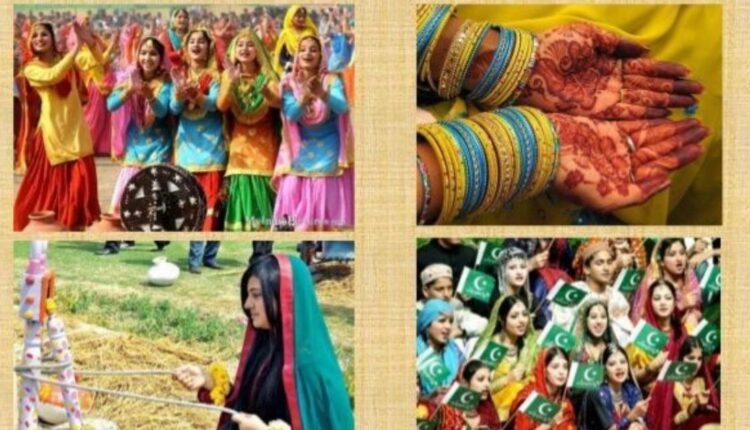ISLAMABAD: Punjab stands at a turning point. For decades, it has shaped Pakistan’s political, economic, and cultural landscape. Yet within the province, a quiet erosion is taking place.
The Punjabi language- once a vessel of poetry, wisdom, and shared memory- is fading from daily life. What’s being lost is more than vocabulary; it’s a connection to heritage, identity, and pride.
“A people without knowledge of their past history, origin, and culture is like a tree without roots.” – Marcus Garvey
For Punjab to contribute meaningfully to a more balanced and united Pakistan, it must rediscover a nationalism that celebrates its own culture while upholding equality among all provinces.
This nationalism must be rooted not in dominance, but in respect for diversity and self-awareness.
The Fading Voice of the Mother Tongue
In cities like Lahore, Faisalabad, and Rawalpindi, Punjabi is increasingly absent from educated households.
Many children today neither speak nor understand their ancestral language. Parents, seeking social acceptance, often switch to Urdu or English, convinced that Punjabi sounds “rough” or “unsophisticated.”But a language is more than a tool for communication- it carries the soul of the people.
Punjabi has preserved the verses of Bulleh Shah, Shah Hussain, and Waris Shah; it has echoed through fields, shrines, and folk melodies for centuries.
When new generations grow up detached from it, they lose a part of their collective memory and emotional depth.
Media and the Making of Shame
This loss is reinforced by how the media depicts Punjabi identity. Television often reduces Punjabi to comedy or caricature, portraying it as loud or rustic.
The word “paindu” has become a lazy insult- shorthand for backwardness or lack of education.
Such portrayals carry lasting damage. They teach young Punjabis that their language is something to hide. Even in rural areas, families are now switching to Urdu at home, fearing that Punjabi might hold their children back socially.
The result is a generation fluent in global languages but alienated from its roots. National media can reverse this narrative by treating Punjabi culture with respect- by showcasing its literature, theatre, and music as symbols of pride rather than punchlines. Language flourishes when it is represented with dignity.
“Diversity is not about how we differ. Diversity is about embracing one another’s uniqueness.” – Ola Joseph
Language as a Bridge, Not a Barrier
True nationalism does not erase differences- it embraces them. Pakistan’s unity depends on recognizing the strength that comes from its linguistic and cultural variety.
Promoting Punjabi is not a challenge to national cohesion; it’s a way to deepen it. When every province takes pride in its traditions and language, mutual understanding naturally follows.
Reviving Punjabi, then, should not be mistaken for provincialism- it is part of building a more confident and balanced federation. Sindhi, Balochi, Pashto, and Punjabi all deserve equal recognition and preservation.
Education: The First Step to Revival
The most practical way to preserve Punjabi is through education. The language should be taught in schools across Punjab and included as a mandatory part of the curriculum.
When children study Punjabi in the classroom and see it valued in the media, they will begin to associate it with identity and pride rather than shame.
Education can rebuild that bridge between modernity and heritage, between progress and belonging.
Autonomy and Equality Among Provinces
A strong Pakistan depends on provinces that feel equally empowered to define their futures.
Realnationalism means supporting provincial autonomy- allowing each region to promote its culture,language, and priorities without interference.
Punjab’s nationalism, therefore, must be introspective and self-critical. It should focus on preserving its cultural integrity while showing solidarity with other provinces’ rights and aspirations.
Unity will only thrive when no province feels marginalized and no language feels inferior.
Rediscovering the Spirit of Punjab
Punjab’s essence has always been one of warmth, generosity, and resilience. Its folk songs, poetry, and humor reflect compassion and inclusivity.
Reclaiming that spirit requires more than nostalgia- it demands conscious action to protect language, celebrate culture, and respect difference.
A renewed nationalism in Punjab is not about supremacy; it’s about self-respect. It means raising a generation that speaks Punjabi confidently, values every province equally, and envisions Pakistan as a shared home grounded in tolerance, dignity, empathy, and understanding.
About the Author:
F. Randhawa explores social and cultural issues affecting communities and society at large,
offering insights on contemporary social matters.





Comments are closed, but trackbacks and pingbacks are open.